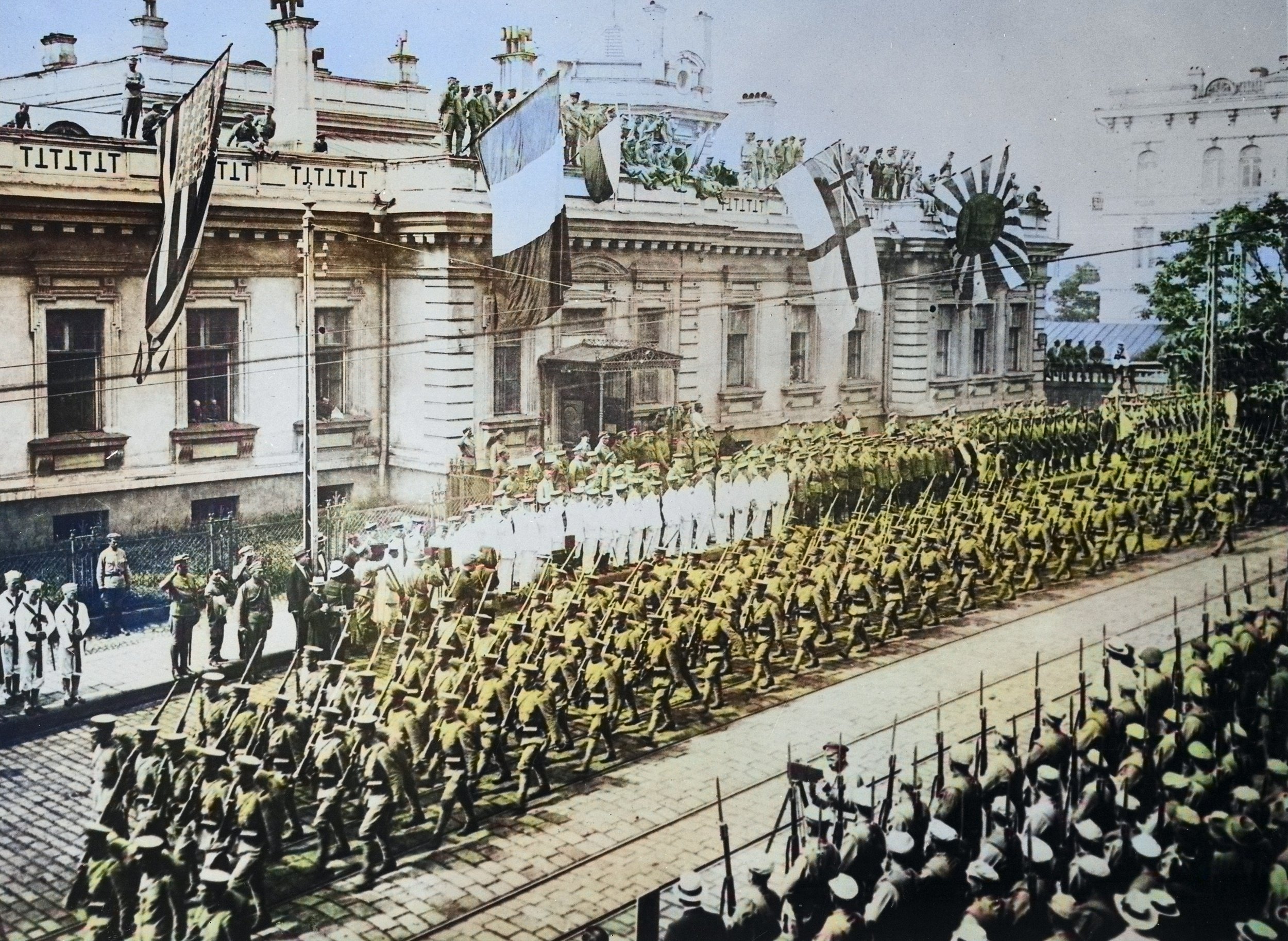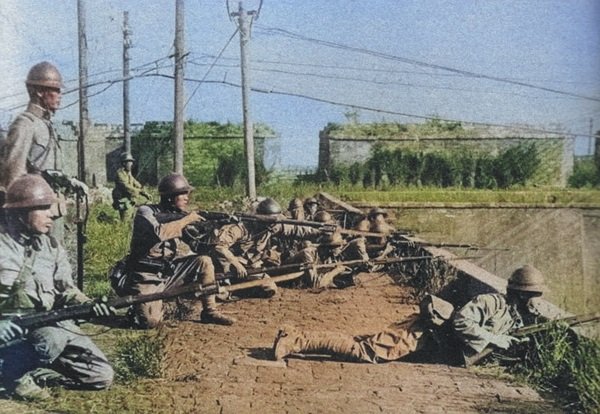The Japanese Empire
Part One: The Interwar Period: 1919-1939
At the end of the Great War the Japanese Empire was given a seat as a major victor at the Versailles peace conference, and was given control over the German colonies in China and most of the Pacific Islands. Japanese troops also joined other Entente forces in their invasion of eastern Russia to support the White Army against the Bolshevik communists, landing in Vladivostok and fighting in Siberia until withdrawing in 1922 with the collapse of the White forces.
Imperial Japanese Army troops participate in an Allied parade through Vladivostok during the Siberian Intervention
At home the Japanese were experiencing an unprecedented political situation: the mental problems of the Emperor, nominally the supreme leader, had resulted in the elected Imperial Diet taking the reins, thus Japan was a de facto democracy. Emperor Yoshihito was mostly a recluse, only occasionally leaving the Imperial Palace to embarrass himself with childish displays, such as turning his speech into a toy telescope and playing with it on the stage of the Diet.
Emperor Yoshihito on his way to a state function
The Japanese had learned a lot from their experiences in the Great War, particularly the power of naval aviation and amphibious operations. The IJN Hosho was launched in 1921, making Japan the first country to operate a modern, purpose built aircraft carrier. They began to work feverishly to build a massive fleet of carriers and modern battleships, as well as building up their new Special Naval Landing Forces for amphibious assaults.
IJN Hosho, the world’s first purpose built aircraft carrier
In 1926 Emperor Yoshihito died, and was replaced by his son Hirohito. The new Emperor began to assert his power, aligning with members of the military command who wanted an end to the democratic reforms of the last decade. The power of the Diet was eroded as the new Emperor began to install military leaders into the government and began acting unilaterally. On May 15, 1932 the Prime Minister, Inukai Tsuyoshi, was assassinated by a group of military officers, and thus the military took control of the country. The last gasp of the old democratically elected governments came later that year, when the next prime minister was also assassinated and this time replaced with a Navy Admiral.
Emperor Hirohito
Meanwhile in the Japanese Imperial possession of Korea, the Army damaged one of their own railways and blamed the Chinese in neighboring Manchuria, using what became known the Mukden Incident as an excuse to invade and take control over the region. They set up a puppet government, Manchukuo, under the leadership of the deposed Chinese Emperor, and continued to make aggressive moves against the rest of China.
Japanese troops during the Mukden Incident
The government under Hirohito began to reinforce existing hatred against non-Japanese ethnic groups both within Asia and without, and used this as a pretext for a massive buildup of military power. The League of Nations condemned the invasion of Manchuria, but the Japanese were undeterred, and simply left, showcasing the impotence of the League to the world at large. In 1937 an incident with Japanese troops supposedly on exercises crossing into China was used as a pretext for a full scale invasion of China.
Japanese troops in Shanghai
The Sino-Japanese War that followed would be characterized by Japanese victories and brutality. By December the capitol of China, Nanking, was taken by Japanese troops, and the ensuing massacres of civilians became known to a shocked world as the “Rape of Nanking”. Up to 300,000 POWs and civilians were murdered by the Japanese Army during an orgy of violence that included newspapers running competitions to see who could murder the most civilians, the assault of almost 20,000 women, and the deliberate burning of more than a third of the city. The Japanese also attacked a US Navy boat, the USS Panay, which was carrying Americans to safety, killing and wounding most aboard. They also clashed with the USSR in the north, which resulted in Japanese defeats, but nothing was to come of them.
Japanese troops in position near wrecked Soviet armored cars in Manchuria
The return of the Japanese to a militaristic culture, glorifying the old Bushido Code of the Samurai, led the Japanese to undertake their wars of aggression with a great deal of brutality, believing that surrendering was the greatest dishonor, and thus treating prisoners brutally. They also viewed themselves as the rightful masters of Asia, the Pacific, and the world as a whole, and anyone who refused to bow to them was to be destroyed in the most barbaric fashion. They generally refused to cooperate with America or European powers, and were thus unrestrained by the arms treaties of those nations, and also held them in a state of general contempt.






